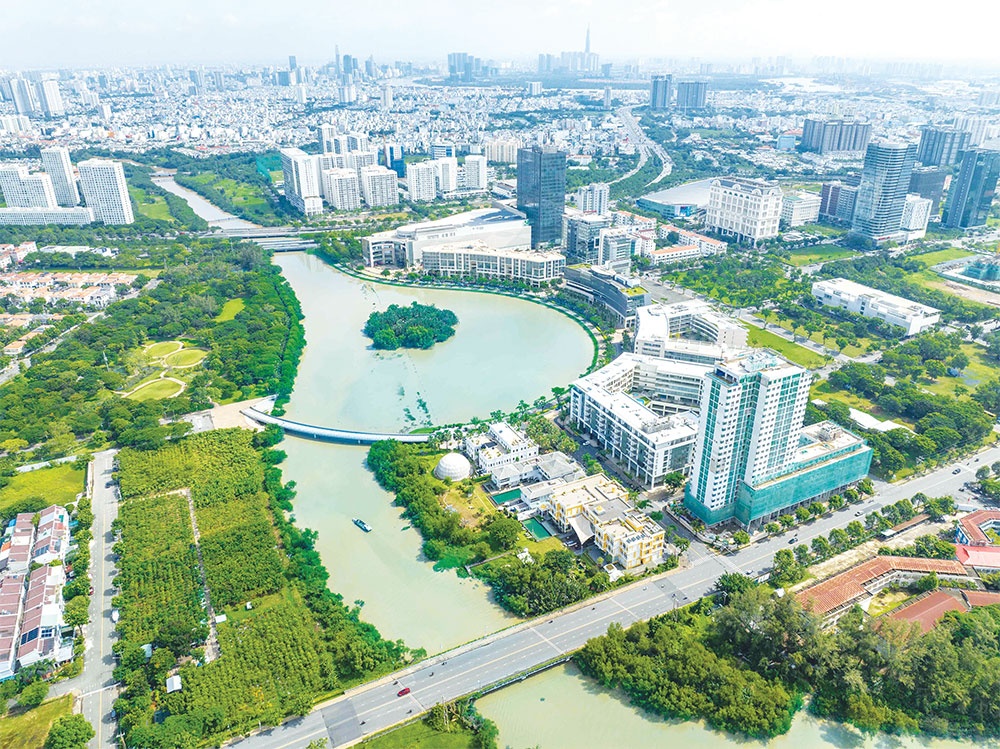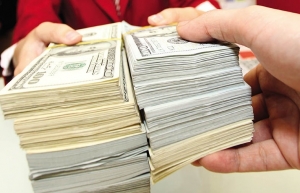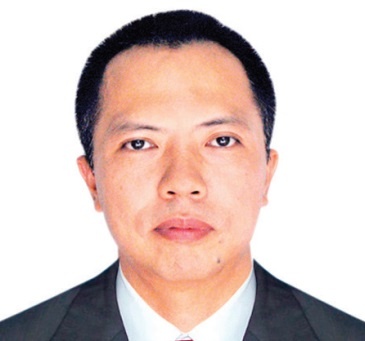Pauses put paid to real estate M&A
The growing interest of large foreign real estate partners and enterprises and the development of private investment funds have been contributing to the excitement of mergers and acquisitions (M&A) in the real estate sector, enhancing competitiveness and increasing market share in the real estate value chain.
However, according to a recent report from the Vietnam Competition and Consumer Authority of the Ministry of Industry and Trade, in 62 M&A transactions recorded in the 10 months of 2022, a total of 202 enterprises participated with 82 foreign enterprises (accounting for 40.59 per cent), domestic enterprises dominate with 120 enterprises.
Particularly in the real estate sector, there were 20 outstanding transactions, most of which come from domestic investors. For example, DRH Holdings JSC received a transfer of up to 99 per cent of shares in Hoa Binh Investment Group and Vinaconex bought 57.82 million shares of Vinaconex Tourism Development and Investment JSC.
Sunshine Homes Development in October also received the transfer of 5.5 million shares in Sao Anh Duong. This transference will increase Sunshine Homes Development to 99 per cent from 51.3 per cent previously.
 |
| Pauses put paid to real estate M&A, Photo Le Toan |
According to experts, legal problems and investment procedures are still a big barrier to foreign M&A activities. Meanwhile, in the domestic sector, they use M&As to focus resources on increasing the scale, capacity and transforming core business areas, as well as taking advantage of the strengths of partners, expanding the market.
According to Trang Bui, CEO of Cushman & Wakefeld Vietnam, a majority of transactions have been made by experienced investors who are well-versed in the volatility and demand pattern of the market and continuously look for good profit margins or portfolio expansion in the region. These deals were in negotiation during the pandemic and achieved agreement in 2022, which explains the surge in recorded deals in the year before October.
“However, since then, property M&A market activities have slowed down due to recent allegations related to multiple real estate and stock companies, amid tightened bank credit flow and restrained bond issuance,” Bui said.
This has led to foreign investors taking a more conservative approach, especially institutional investors, financial institutions, and new entrants to the market. “Some investors have pressed the pause button to restructure their investment strategy to adapt to the new situation. While these investors are still well-funded, new major investments will be paused for the time being, except for ongoing deals,” Bui added.
For more activities to take place in the market, Vietnam will need to achieve a higher level of transparency, sound urban planning, and a stronger legal framework to attract foreign investors, she explained. “Once the regulatory review is completed, we expect supply growth to be able to meet demand, and the market will be more transparent and efficient for foreign investors,” Bui said.
As a legal consultant for M&A activities, Bui Ngoc Anh, a representative of VILAF, also revealed that in the last 2-3 years, the legal appraisal process for such activities took longer than usual.
“Both the buyer and the seller must spend more time and money to learn and evaluate before deciding to close the deal. This is reasonable because many real estate enterprises have shown off black halls in their business operation and this force potential partners to think twice before decision. Potential partners must double-check the financial source and legal documentation of the projects to avoid risk,” said Anh.
Seck Yee Chung, partner at Baker McKenzie Vietnam, said that the real estate market should be in frozen for a while, but depending on the segment. For example, deadlock is seen in commercial residential segment while warehouse real estate or logistics still have much room for development.
“Moreover, consumers’ needs for delivery change with faster delivery so investors will be more interested in investing in large data centres and warehousing,” Chung confirmed.
| Elaine Chew - Special counsel ACSV Legal
It should be recognised that the government has made a tremendous effort to encourage capital flows into Vietnam in the post-pandemic time. The challenges faced by investors in Vietnam, however, are two-fold – firstly, the interpretation of the laws of Vietnam and, secondly, the implementation of them. The laws of Vietnam are generally drafted broadly, followed by a succession of decrees, circulars, and directives from the relevant ministries and government departments, with the intent to provide greater clarity and guidance on such laws. However, with such authorisation to ministries and government departments to issue these clarifications independently, this has resulted in conflicting provisions, interpretation, and, naturally, uncertainty in the legal framework and its implementation. While this is common in an emerging market (as Vietnam is finding its footing), it is a risk that needs to be accepted by investors in this instance. It is still frustrating for investors looking for some semblance of consistency and predictability. Phan Xuan Can - Chairman SohoVietnam
Many ventures in urban development, office buildings, hotels, resorts, and other under-construction projects lack some legal documents and this bring very high risk for any investors if they go deep into it without enough information. However, upcoming real estate M&As depend on cash flow. The nature of the market completely depends on whether it is possible to borrow capital to acquire projects. Both foreign and domestic investors are facing difficulties in cash flow due to rising interest rates, tight credit and falling asset prices. Therefore, at this time, whoever holds cash is king, regardless of whether they are domestic or foreign investors. For foreign investors, especially those who are new arrival in the market, they will often set very high criteria such as legal completion and projects located in the central area to minimise risks even if they can be bought at a very high price. However, in reality, there are not many projects that satisfy these conditions. It takes 3-5 years for foreign investors to fully understand the market so that they can make decisions at the right time. Tran Duc Phuong - Lawyer Ho Chi Minh City Bar Association
Real estate M&A activities take place in many different forms. For projects that are legally eligible for transfer, the simplest way of making a deal is to transfer directly to the buyer, but in reality, there are not many of these projects. Most of them are now unfinished in terms of legal procedures, and many of those have site clearance compensation still to be carried out. Therefore, the current popular way is to acquire the project through shares by the investor. However, it is a fact that each business may have some projects, but the buyer is not interested in all of them, nor does he want to receive 100 per cent of the business capital for the fear of unexpected risks. In such cases, both the seller and the buyer fall into a deadlock. Therefore, it is necessary to have professional consulting units together to minimise and eliminate these risks for both the buyer and the seller. In general, for a successful M&A, transparent information is the most important factor. Partners must understand and trust each other so they can find a common voice and common benefits. |
 | Real estate companies and banks take international loans Many real estate companies and banks are mobilising capital from foreign funds in the context of the ongoing credit crunch in Vietnam. |
 | Law tweaks can allure real estate investors The property market of Vietnam has always been attractive to foreign investors due to Vietnam’s vibrant, thriving economy and increasing wealth of the population. |
What the stars mean:
★ Poor ★ ★ Promising ★★★ Good ★★★★ Very good ★★★★★ Exceptional
Related Contents
Latest News
More News
- An Phat 5 Industrial Park targets ESG-driven investors in Hai Phong (January 26, 2026 | 08:30)
- Decree opens incentives for green urban development (January 24, 2026 | 11:18)
- Public investment is reshaping real estate’s role in Vietnam (January 21, 2026 | 10:04)
- Ho Chi Minh City seeks investor to revive Binh Quoi–Thanh Da project (January 19, 2026 | 11:58)
- Sun Group launches construction of Rach Chiec sports complex (January 16, 2026 | 16:17)
- CEO Group breaks ground on first industrial park in Haiphong Free Trade Zone (January 15, 2026 | 15:47)
- BRIGHTPARK Entertainment Complex opens in Ninh Binh (January 12, 2026 | 14:27)
- Ho Chi Minh City's industrial parks top $5.3 billion investment in 2025 (January 06, 2026 | 08:38)
- Why Vietnam must build a global strategy for its construction industry (December 31, 2025 | 18:57)
- Housing operations must be effective (December 29, 2025 | 10:00)




 Tag:
Tag:


















 Mobile Version
Mobile Version